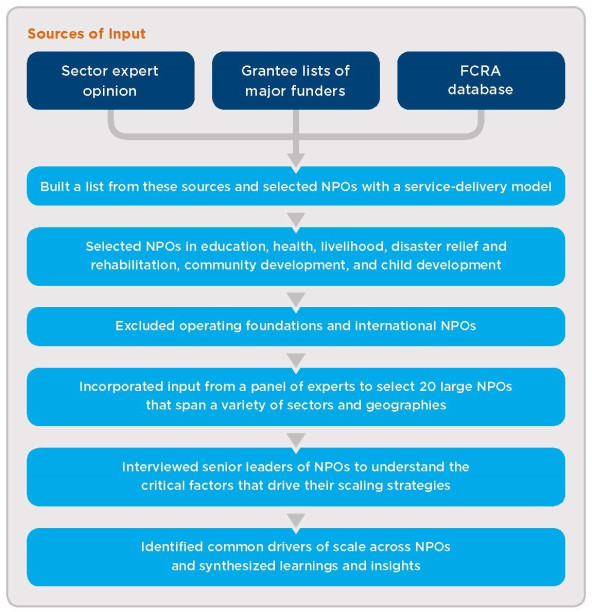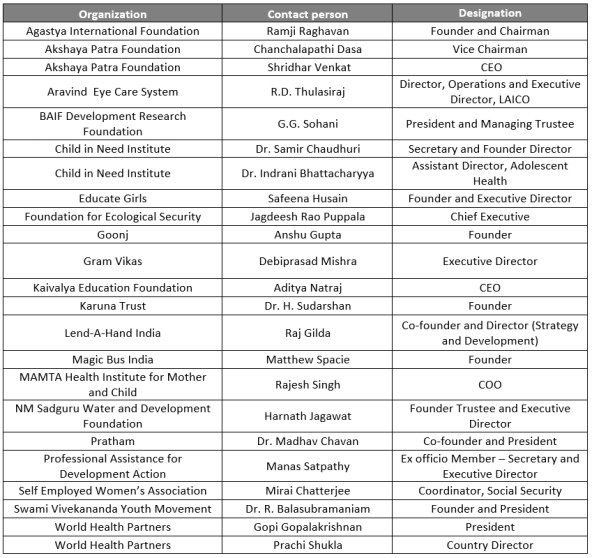Our research for this article revealed five strategies, or mind-sets, that leading Indian nonprofit organizations (NPOs) use to extend their reach to many more people in need. We recognize that “more” doesn’t always equal “better”—that in fact, some organizations succeed by targeting a discrete intervention to a very specific population. But in a country as vast and varied as India, where more than 250 million people live on a daily income of less than $2, many NPOs at least want to consider widening their scope to include more beneficiaries. Hence, this study.
To surface the most promising mind-sets for scaling, we first worked to identify a cross section of 20 Indian NPOs that work in different sectors and regions and deliver services to hundreds of thousands (and in some cases, millions) of people. We focused on those organizations that scale through replication—they build a successful program and duplicate the intervention, in its fully prescribed form, in other geographic areas so as to reach a greater number of people. Other methods of scaling, such as developing promising ideas that partner organizations execute on, stand outside of this project’s scope.
Since most NPOs in developing countries focus on service delivery, our research encompassed those sectors where scaling is potentially most beneficial, such as education, health, livelihood, disaster relief and rehabilitation, community development, and child development.
We didn’t examine the growth strategies of NPO intermediaries (which seek to align and augment the efforts of direct-service organizations and thereby advance the entire field), granting or re-granting NPOs, policy and advocacy NPOs, research NPOs, and institutions such as universities and hospitals. We also excluded such entities as:
- Operating foundations, which typically benefit from dedicated funders and access to large amounts of capital
- International NPOs—such as CARE, Oxfam, and Plan International—since they have access to large amounts of capital and established processes, as well as globe-spanning reputations that are magnets for international talent
In the absence of a comprehensive NPO database that includes such parameters as operating budgets, funding amounts raised, and the number of employees and beneficiaries, we adopted a qualitative research methodology that’s supported by data where available.
The diagram below outlines our approach.
We used three sources to identify a preliminary list of more than 50 NPOs:

1) Sector expert opinion: We interviewed more than 35 sector experts, including philanthropists, the senior leaders of granting and re-granting organizations, and leaders of NPOs and intermediaries. We asked them to identify NPOs in India that have successfully scaled their reach. We then studied those NPOs that received multiple mentions.
2) Grantee lists of major funders: Working from the grantee lists of more than 20 major funding organizations in India, we selected grantees that: a) have annual costs of more than INR 10 Cr. (roughly $1.5 million) and b) receive grants from multiple funders.
3) FCRA database: We analyzed India’s Foreign Contribution Regulation Act (FCRA) database and included those NPOs with an average foreign funding of more than INR 10 Cr. (roughly $1.5 million) over the past three years.
After combining input from the above three sources, we built a preliminary list of NPOs. We studied those organizations in greater detail and reviewed them with civil society experts and philanthropists. (See “Sector Expert Interviewees” list below.)
We then curated the list of NPOs and created a sample set of 20, representing different sectors and locales. We followed up with detailed interviews with the senior leaders and conducted secondary research to better understand their mind-sets for scaling. Our interviews focused on such critical issues as funding, strategy, leadership, organizational structure, impact assessment, technology, systems, and processes.
These discussions surfaced best practices and common barriers to growth, along with the mind-sets these NPO leaders use to address them. It’s our hope that the article’s insights might help international NPOs enter new locales and enable NPOs (as well as philanthropists and foundations) already operating in developing nations like India bring successful interventions to many more people.
Sector Expert Interviewees
- Amit Chandra, a leading philanthropist, featured in Forbes Asia’s “Heroes of Philanthropy”
- Alkesh Wadhwani, Director Health, India Country Office, Bill & Melinda Gates Foundation
- Anantha Padmanabhan, CEO, Azim Premji Philanthropic Initiatives
- Anurag Behar, CEO, Azim Premji Foundation
- Bikkrama Daulet Singh, Associate Director, Central Square Foundation
- CV Madhukar, who leads Governance & Citizen Engagement investments for Omidyar Network India Advisors
- Debasish Mitter, Country Director, India, Michael & Susan Dell Foundation
- Govind Vaidiram Iyer, Country Head, Egon Zehnder’s Private Equity Practice in Asia
- Laura Ghiron, Vice President, Partners in Expanding Health Quality and Access
- Lisa Smith, Director, Partnerships and Development, Director of the Leaders’ Quest Foundation
- Mary Ellen Matsui, Executive Director, Atma
- Maria May, Senior Program Manager, BRAC Social Innovation Lab
- Meenakshi Batra, CEO, Charities Aid Foundation India
- Moutushi Sengupta, Director, MacArthur Foundation India
- Naghma Mulla, COO, EdelGive Foundation
- Nehal Sanghavi, Sr. Advisor for Innovation and Partnership, USAID
- N.R. Narayana Murthy, Philanthropist, Founder, Infosys
- Nidhi Bajra, Deputy Manager, Sustainability and Outreach, Shiv Nadar Foundation
- Noshir Dadrawala, Chief Executive, Centre for Advancement of Philanthropy
- Padmini Somani, Founder and Director, Salaam Bombay Foundation
- Pamela Srivastava, Head, Sustainability and Strategic Partnerships, Shiv Nadar Foundation
- Pakzan Dastoor, Manager, Advisory Research & Due Diligence, Dasra
- Ramachandran Venkataramanan, Managing Trustee of all the Tata Trusts
- Ravi Venkatesan, Chairman, Social Venture Partners India
- Rohini Nilekani, Chairperson, Arghyam
- Shankar Venkateswaran, Chief, Tata Sustainability Group
- Shyaam Subramanian, Chief of City Operations, Teach For India
- Sohini Bhattacharya, Vice President, Resource Mobilization, Breakthrough
- Supriya Sankaran, Director, Venture and Fellowship, Ashoka India
- Vanessa D’Souza, CEO, SNEHA
- Venkat Krishnan N, Founder and a Director of GiveIndia, India’s first philanthropy exchange
- Vidya Shah, CEO, EdelGive Foundation
- Vishnu Swaminathan, South Asia Representative, Ashoka India
Interviewees from the 20 Selected NPOs

Support SSIR’s coverage of cross-sector solutions to global challenges.
Help us further the reach of innovative ideas. Donate today.
Read more stories by Soumitra Pandey, Swati Ganeti & Rohit Menezes.

